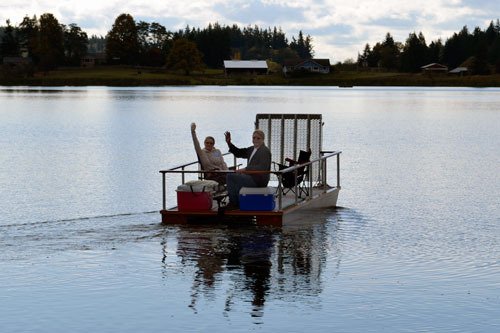The first time Second District Congressman Rick Larsen heard about the Fishing Access Network, he saw a presentation with a scale model replica of the disabled-access boat Mike Mayes and Ralph Brotherton were trying to raise money to build.
This time, Larsen got an up-close and personal look at the ‘Accessible’ at the boat launch on Lone Lake, near Langley on Thursday.
“This is a great project,” Larsen told Mayes as he stood on the deck of what is believed to be the first boat ever built specifically for disabled access. “It’s good to see the next step.”
Larsen said he was impressed with the project and Mayes’ dedication to see it through.
“I love to fish and I love the fact this project has gone this far,” Larsen said. “It sends an important signal to disabled veterans and others that fishing season is here.”
Mayes said it cost about $6,000 to put the Accessible, powered by an electric motor, together. He and Brotherton hope to be able to place it — and other boats like it — at lakes across the region. Volunteers will be available to take anyone who is disabled out on the water to fish. While other boats have to be modified or use hoists for disabled access, the pontoon-style Accessible has a built in aluminum ramp that can be raised or lowered, making wheelchair access easy.
Construction began in July and the first water trial took place Oct. 12. Mayes said all he could do when the Accessible hit the water was smile.
“It was cold and windy with a light drizzle,” he said. “As soon as we put her in and she floated on the designed water line, I wasn’t cold any more.”
“I’m impressed with all the volunteer efforts that have gone into this — all the time and materials as well,” Larsen said.
Mayes explained to Larsen how the vessels could also be used for recreational therapy for veterans being treated at the Seattle VA Hospital.
“I’m really pleased with the way it turned out,” said Mayes. “I think (Larsen) will help us find the funding we need, and with a little help in the right direction, we’re golden.”
The Fishing Access Network has also joined forces with the nonprofit group Fishing Has No Boundaries and Mayes said they are planning their first disabled fishing event on Deer Lake next summer. He hopes to have several more of the boats completed by then.
Other issues
Larsen’s visit to Lone Lake came on the heels of an appearance at American Legion Post 141 in Langley. The Congressman is holding a series of roundtable discussions with veterans around the region.
About two dozen veterans turned out for the discussion, including Larsen’s opponent in the upcoming general election, Republican Dan Matthews, along with several members of Whidbey Island Republicans, who asked several questions pertaining to the Medicare, Tricare and Tricare for Life programs.
“Are you committed to no increases in premiums for Tricare?” asked retired Army Col. Jim Cloore of Langley.
“If the vote is a stand alone vote and the issue is not part of a bigger defense bill, then yes,” Larsen said. “But if you’re asking me to vote no to a series of spending proposals that are part of a bigger bill for the sake of one issue, we’d have to discuss that.”
Also of concern to veterans at the Langley meeting was the nation’s deficit and what it means to younger generations.
“How is the government going to reduce all this to get to a balanced budget?” asked Navy veteran Bill McAffee.
“In Congress, unfortunately, there are those on both sides of the aisle that want to have a conversation about whose fault (the deficit) is,” Larsen said. “I’d rather have a debate about how we move forward.”
Larsen said he thinks the plan to cut $1.2 trillion over 10 years is good in one respect, because it will alleviate the unhealthy debt-to-GNP (Gross National Product) ratio.
“If the economy is growing faster than the debt is accumulating, that’s good,” he said. “That’s what we should be heading to.”



